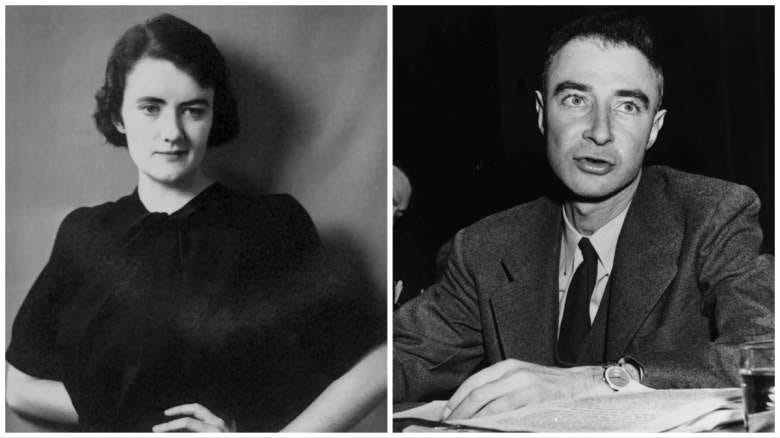Jean Tatlock Deserved Better in Oppenheimer
The Golden Globe-winning blockbuster missed an opportunity to explore a complex and intelligent woman.
Christopher Nolan’s portrayal of Jean Tatlock in Oppenheimer misses an opportunity to represent a female love interest who is as complex and intelligent as her lover.
Jean, played by Oscar-nominated Florence Pugh, spends most of her onscreen time naked and orgasming. And as much as I love Pugh, this hardly makes for an engaging character. Nolan is known for his half-baked (some argue misogynistic) portrayals of women. His portrayal of Jean failed to capture her intelligence, sensitivity, and psychological complexity.
The main problem with Nolan’s version of Jean Tatlock?
She is a mere instrument pushing Oppenheimer to settle down with Kitty, not a participant in a genuine human relationship.
Nolan depicts the relationship between Jean and Oppenheimer as one of mutual sexual attraction and emotional intensity, defined by Jean’s indifference to Oppenheimer’s love. Their sexual encounters appear as a point of entry for Oppenheimer from the land of quantum abstraction back into the tangible, physical world.
Based on this portrayal of their time together, I was shocked when I read that Oppenheimer and Jean dated for three years and were engaged twice.
In the film, Jean relates to Oppenheimer with a confusing mix of desire and indifference. Soon after their sex scene where Oppenheimer reads from the Bhagavad Gita, we see Jean throwing away flowers from Oppenheimer and instructing him to quit bringing them to her. Later, when Oppenheimer and Jean discuss his engagement with Kitty:
Oppenheimer: “We both know I’m not what you want.”
Jean: “Yeah. But it’s a door closing.”
Both of these moments make the love affair between Oppenheimer and Jean appear one-sided. Oppenheimer loves Jean, but she remains confused.
She calls him; she needs him, but she doesn’t want him.
However, neither in Nolan’s source material, the Pulitzer-winning biography “American Prometheus” nor any independent research I’ve done characterizes Jean as indifferent.
I can see why Nolan needs to undermine the connection between Oppenheimer and Jean to explain why Oppenheimer would abandon his “truest love” and marry Kitty. Still, this plot choice disrespects not only Jean as an individual but also her relationship with Oppenheimer.
But Nolan is not satisfied to leave Jean indifferent to Oppenheimer’s affections, he also diminishes her intelligence. He places Jean’s practical intelligence in opposition to Oppenheimer’s cerebral aloofness.
For example, she explains the poison apple incident as Oppenheimer just needing to get laid. She criticizes Oppenheimer for failing to act on his communist adjacent ideas. Her no-nonsense attitude rejects his ideas of grand romance.
But Jean is not the practical woman of Nolan’s film. Her personality hinged on her incredible intellect, much like Oppenheimer himself. The daughter of a Harvard Chaucer scholar, Jean never lacked intellectual prowess.
One of her classmates at Vassar explained Jean was, “the most promising girl I ever knew, the only one of all that I saw around me in college that even then seemed touched with greatness.” Jean went on to graduate from Stanford Medical School at a time when female medical students were still uncommon.
My reading of the historical work suggests Oppenheimer and Jean might have suffered more due to their similarities: heady intellect, turbulent emotions, and insecurities than they did due to differences.
Compared with Oppenheimer’s wife Kitty, who although plenty intelligent favored the pragmatic over the esoteric, Jean is more of a mirror to Oppenheimer than a counterweight.
Their attachment went the way many attachments between intense, intellectual, and emotionally distraught individuals go — painfully and poorly, but their relational failures appear to be due to the complexities of Jean as an individual, not her sexuality or pragmatism.
Ironically, in erasing Jean’s intellect Nolan also erases one of the key distinguishing factors between her and Kitty, thus leading him to invent the narrative of her indifference to explain Oppenheimer's choice of spouse.
I find the emotionally distant, libidinous woman in Nolan’s film to be a poor imitation of the real Jean Tatlock, who appeared to think deeply, love truly, and dream of a world better than the one she inhabited.
I can’t help but imagine what might have been if Jean’s humanity in all its dynamism and complexity was given more room to play.






Great piece, Jess!
I can’t help but think about her portrayal in a miniseries, compared to a movie - feels like a natural place to dive much deeper.